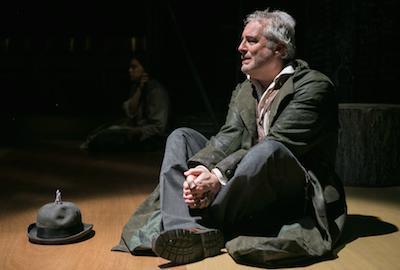A Poetic Adaptation of ‘Falling Out of Time’
By • April 18, 2016 0 1031

A number of years ago, I saw a play in which the author declared in the program that what we were about to see was not really a play, but a poem.
He was right. It was not a play, but a poem, which — while affecting — didn’t work as a piece of theater.
Something similar is at work at Theater J in the admirable, affecting and sometimes powerful production of “Falling Out of Time” by celebrated Israeli writer David Grossman, famous both for short stories and works of nonfiction. An exploration of human grief, “Falling Out of Time” feels and looks and is played and performed like a ritual. At times recalling the chorus in Greek tragedies, it could be a dramatic or cathartic church service, a memory of a dream or even a long poem. It resembles a recessional and processional with speaking parts.
I don’t mean to suggest that the production isn’t moving; it almost always is, once we get the hang of the people involved and what they are attempting to do. The people and their plight are the saving graces of “Falling out of Time,” because grief is the burden of being human. We will all suffer losses, along with the prospect of our own disappearance from time.
“Falling Out of Time” concerns itself with the acutely painful and terrible loss of children, as suffered by those left behind. It’s a personal issue for Grossman: his son, an Israeli soldier, was killed in the Lebanon War at a young age, and his loss is, if not the centerpiece, the jumping-off point for the work.
“I want to go there,” says the character identified as the man to his wife, meaning (as we learn through the course of this no-intermission work) he wants to fall out of time to be in proximity to his son — not dead, but not living in this time either. It’s not the simple desire to see the lost loved one, but the deeper need to have contact with the world in which he exists, to find meaning and relief from the fact of death, by entering its world.
There are others here — all of whom have suffered a similar loss, the death of a child, a death from an illness, an accident, a drowning, all of them sons and daughters now gone, the space they occupied in the lives of fathers and mothers hugely empty and full of unassuaged pain. There is a centaur, his body rooted below the surface, a chronicler of life in a village and his wife, a cobbler and his wife, a teacher, a count, a midwife.
As the man embarks on his journey, explaining the need to go, the others, one by one, tell their stories. And one by one they embark on the same journey, conducted by walking up the stairs and across a lane midway through the audience, down to the stage and back and around again. One by one, they “fall out of time” and join what sometimes resembles that dance of death from Ingmar Bergman’s “The Seventh Seal.” They are joined together, holding hands, sometimes apart, until they come to the place, the “there” of there, to commune with what is left of their children in the other place and time, imitating death.
Mind you, you could get very involved in all this, and with the litany of sorrows and stories expressed by people onstage. They’re very individualized in terms of how they look, their clothes, their manner of moving, their voices, so that we feel for them. But they are not in the end either characters or people; they are, well, walking, touching, echoing poems of their own sufferings.
Because of this, the play is not really theater, it is literature. That’s very difficult for actors to play. There are some very fine actors doing their best with what they have, including Edward Christian as the ranting, raving centaur, the imposing John Lescault as the Duke, Michael Russotto as the ragged chronicler and the always impressive Nanna Ingvarsson as the chronicler’s wife, with Erika Rose giving the wife of the grieving man a down-to-earth freshness that the play badly needs.
Adapted and directed by Derek Goldman, “Falling into Time” is beautifully written, and it has the same power that some poems do, which is to make certain moments unforgettable. But it needs to be a play to truly complete the circle that it’s created.

